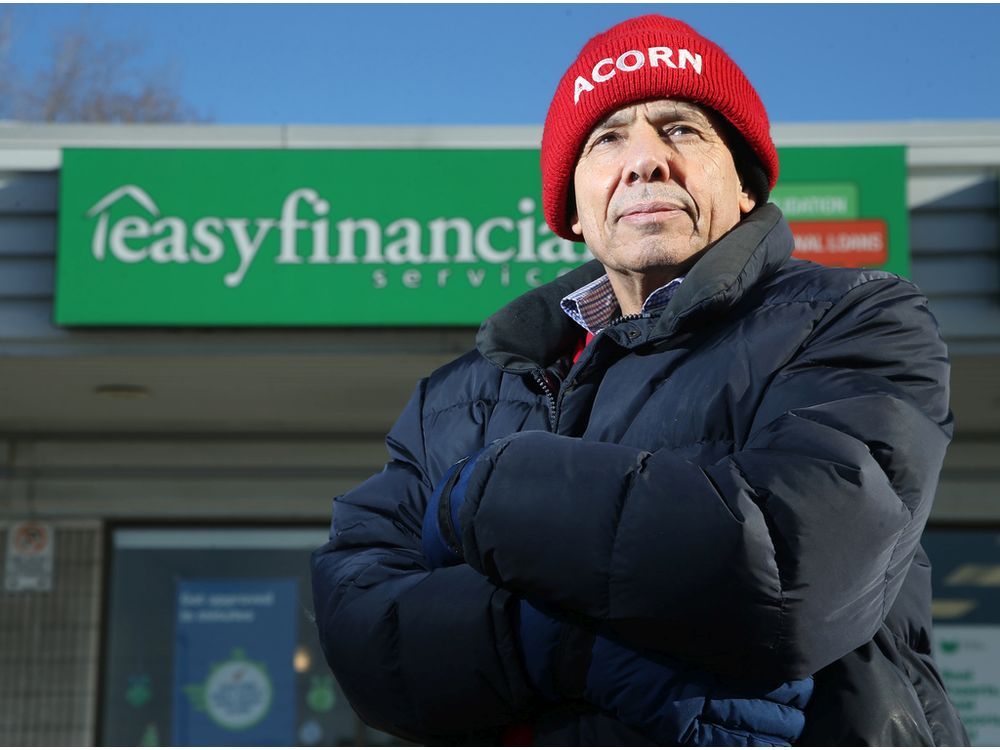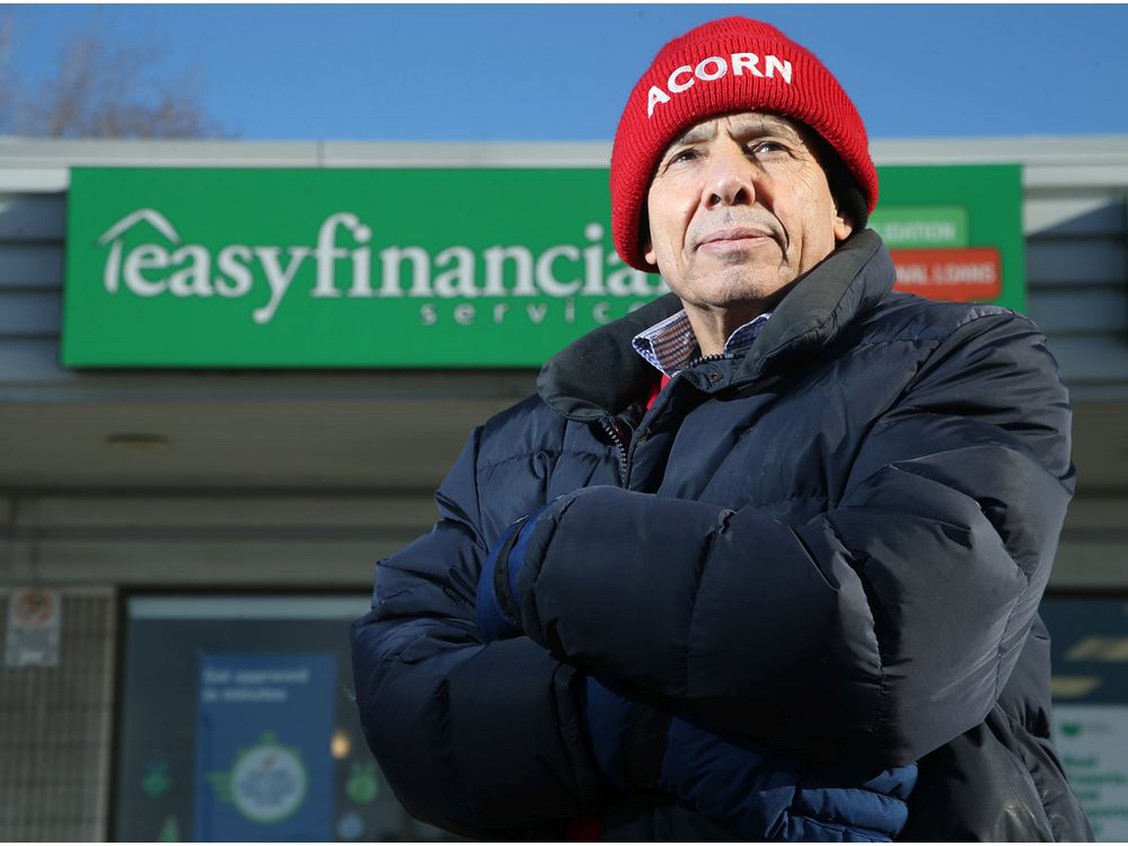Ottawa Citizen: Anti-poverty advocates call on federal government to curb ‘predatory’ lenders
Posted January 4, 2022
Posted January 4, 2022
 Low-income families are in the midst of a “critical” time of the year as anti-poverty advocates are once again calling on the federal government to lower the mandatory maximum interest rate in an effort to curb “predatory” lenders.
Low-income families are in the midst of a “critical” time of the year as anti-poverty advocates are once again calling on the federal government to lower the mandatory maximum interest rate in an effort to curb “predatory” lenders.
ACORN (Association of Community Organizations for Reform Now) members across the country held a national day of action earlier this month with demonstrations staged at payday lenders, where people shared personal testimonials of becoming “trapped in a cycle of debt,” according to Bader Abu-Zahra, chair of the Vanier ACORN chapter.
Vanier has among the highest concentrations of payday lenders in Canada, Abu-Zahra said, and the pandemic has only increased the demand.
“At this time, during the pandemic, people will have emergencies and they are forced to go to these lenders,” Abu-Zahra said. “They cannot get approved for a bank loan because they don’t make enough money, so they have to go to these payday lenders — not because they want to, but they’re forced to take this money.”
Once they sign on for a loan, Abu-Zahra said, he’s heard dozens of stories about “excessive” phone calls, either to offer more loans or incentives, or to collect on existing ones.
“They say they have excessive phone calls, (lenders) calling to offer services, to offer loans, and they’re also calling and harassing them to collect.”
ACORN conducted a national survey of its members and found more than half have an annual individual income below $20,000, and 70 per cent of respondents said they’ve taken on a high-interest loan, with lending rates between 45 and 60 per cent.
Of the 376 survey responses collected earlier this year, 30 per cent reported taking out one loan in the previous 12 months, while 13 per cent said they took out more than ten loans during the same period.
The organization collected testimonials from people across the country, including Grace, an Ottawa mother who is still paying off a $5,000 loan she borrowed from a payday lender four years ago.
“Everything was going okay but then I lost my job due to COVID-19,” she wrote.
With no employment, she first turned to Ontario Works and the federal CERB program, but faced enormous financial hardships with two daughters and one in university.
Making things immensely worse, Grace wrote, were the incessant “threatening” phone calls.
“They keep calling me, harassing, keep telling me that they want to start all over again,” she wrote. “I can’t do it, I have no money. I don’t care about my credit, I have to think about myself, my children. I am under too much stress, I don’t want to fall in depression.
“The interest rate on these loans is just too high,” she wrote. “The balance that I owe is much more than what I took out despite making regular payments for quite some time.”
A “vast majority” of respondents (80 per cent) said they took out loans to meet everyday living expenses like rent, groceries and utility bills.
Others said they needed loans to cover medical expenses, illnesses and car repair expenses, and notably, ACORN said 22 per cent of respondents took loans because they were told it would help pay off other loans to improve their credit rating.
“People don’t always have the knowledge of the legal terms, or knowledge of reading the contracts. And (with) that lack of understanding, I believe, people are being taken advantage of,” Abu-Zahra said.
There are often hidden costs associated with loans, inflating the overall lending rate and increasing the payments.
“So they may sign for one interest rate, and they don’t realize that there are added lending costs, fees and insurance that makes the actual interest rate much higher,” Abu-Zahra said.
The Canadian Consumer Finance Association, which represents businesses that provide retail consumer financial services, said in a statement its members are already “highly regulated and licensed” under various provincial legislation across Canada.
“Payday loans are highly regulated and fees charged are set by provincial governments based on their analysis of the cost to offer the product,” the CCFA said in a statement.
“Many hard working Canadians are unable to access either short-term or long-term credit from banks, credit unions and trust companies. Government studies have found people access these loans from our members responsibly for necessary expected and unexpected expenses.
“We would all like to pay less for products and services, however governments should not further restrict interest rates that a lender can charge. If they did, the only result would be that a larger cohort of Canadians would be denied access to credit, or at least credit from a government regulated lender.”
The demand for credit would not change, the CCFA stated, “and would simply shift to illegal online unlicensed lenders.”
ACORN said agencies offering online credit “pose some of the same risks to consumers as storefront credit does, but could possibly be exposing them to additional risks, as many online high-cost credit providers are not licensed or regulated.”
ACORN is calling on the federal government to lower the maximum interest rate from 60 per cent to 30 per cent, to amend the criminal code to include language specific to payday lenders, and to step in to require banks to lower the non-sufficient funds (NSF) fee to $10.
Critically, the organization is asking the government to reform banking legislation to ensure basic financial services are available to all Canadians.
“The federal government must mandate banks to provide an affordable loan for low- and moderate-income people backstopped by the government of Canada,” ACORN stated, “so they can avoid predatory lenders in a time of personal financial crisis.”
***
Article by Aedan Helmer for the Ottawa Citizen

